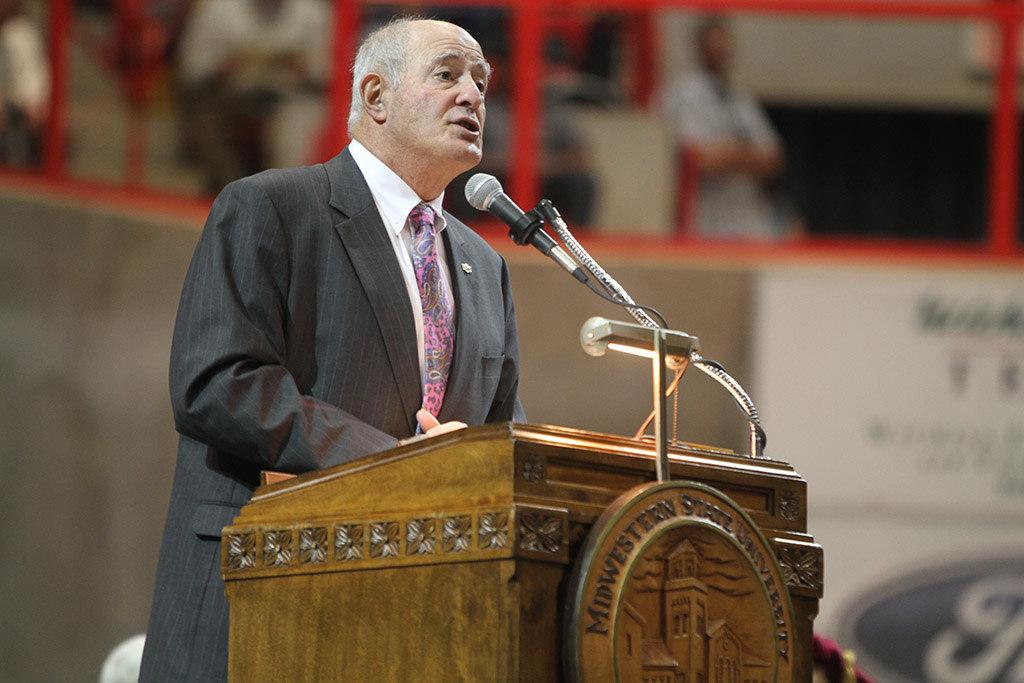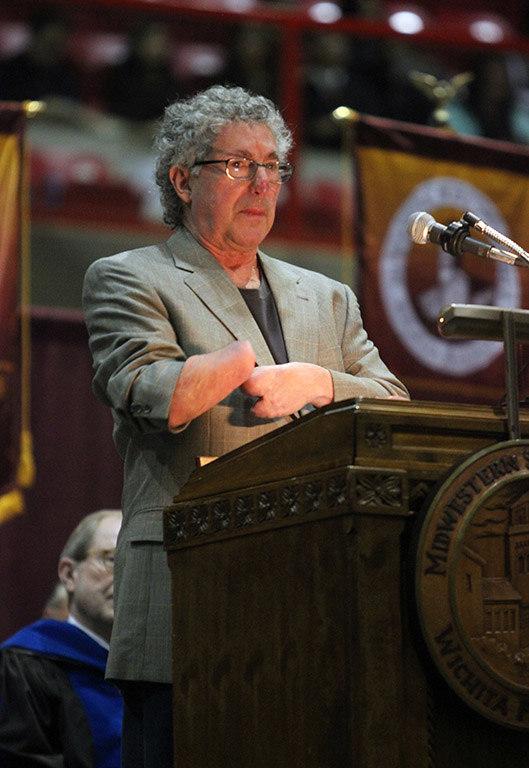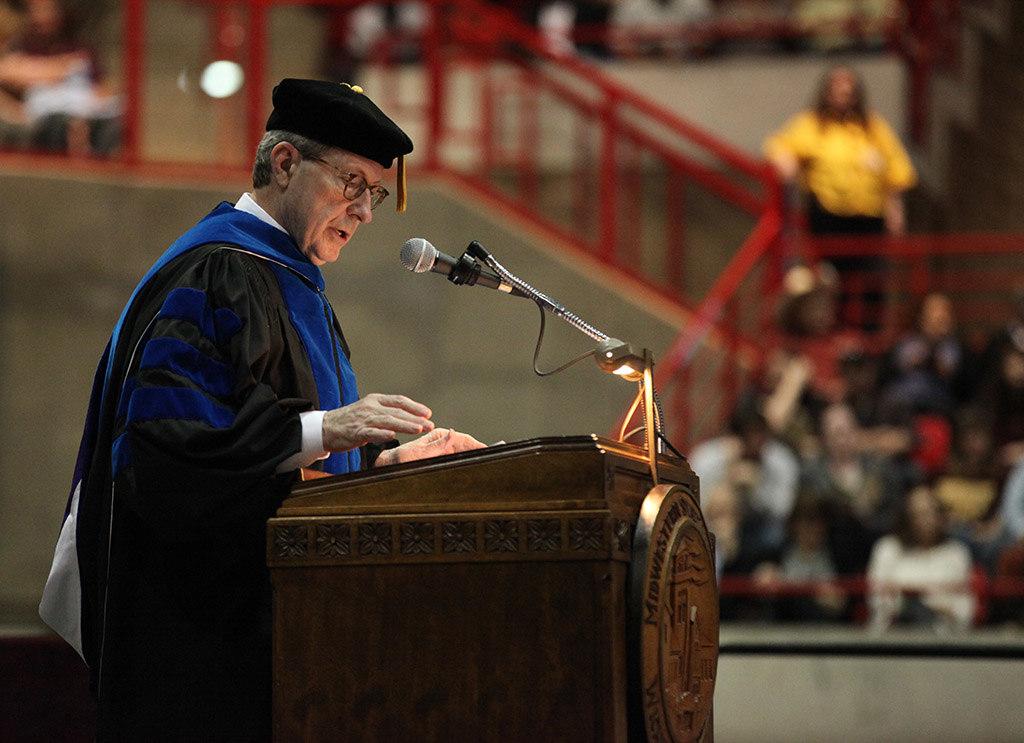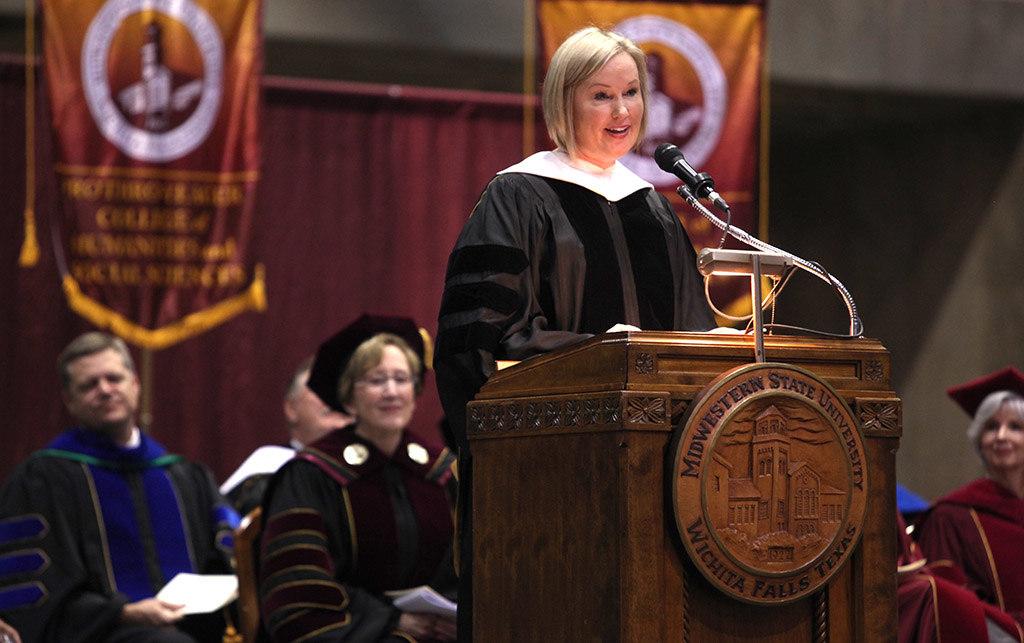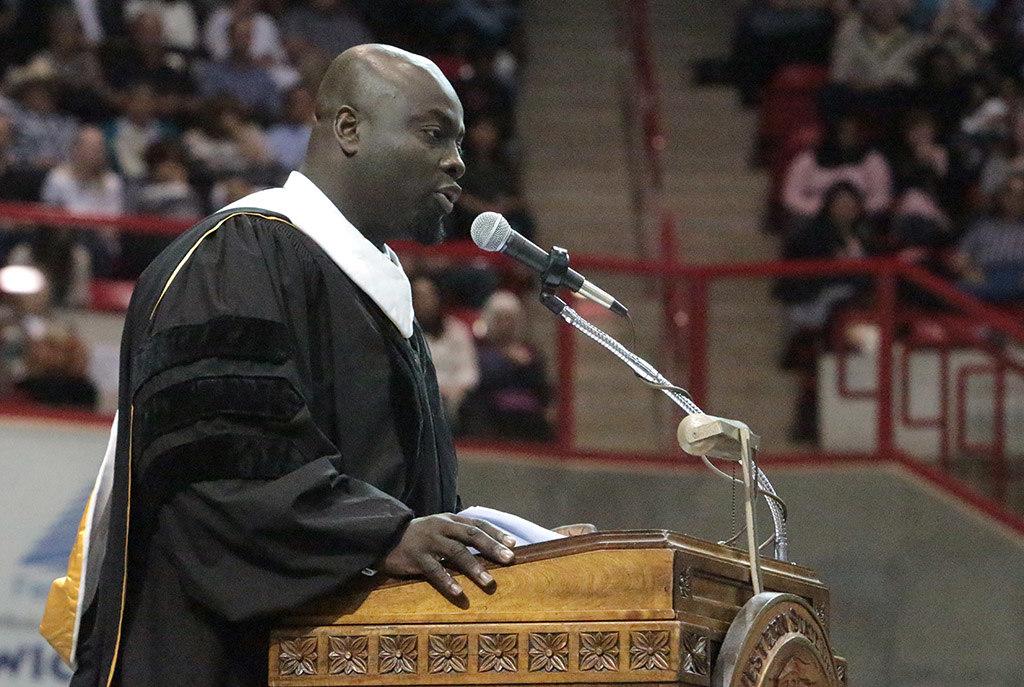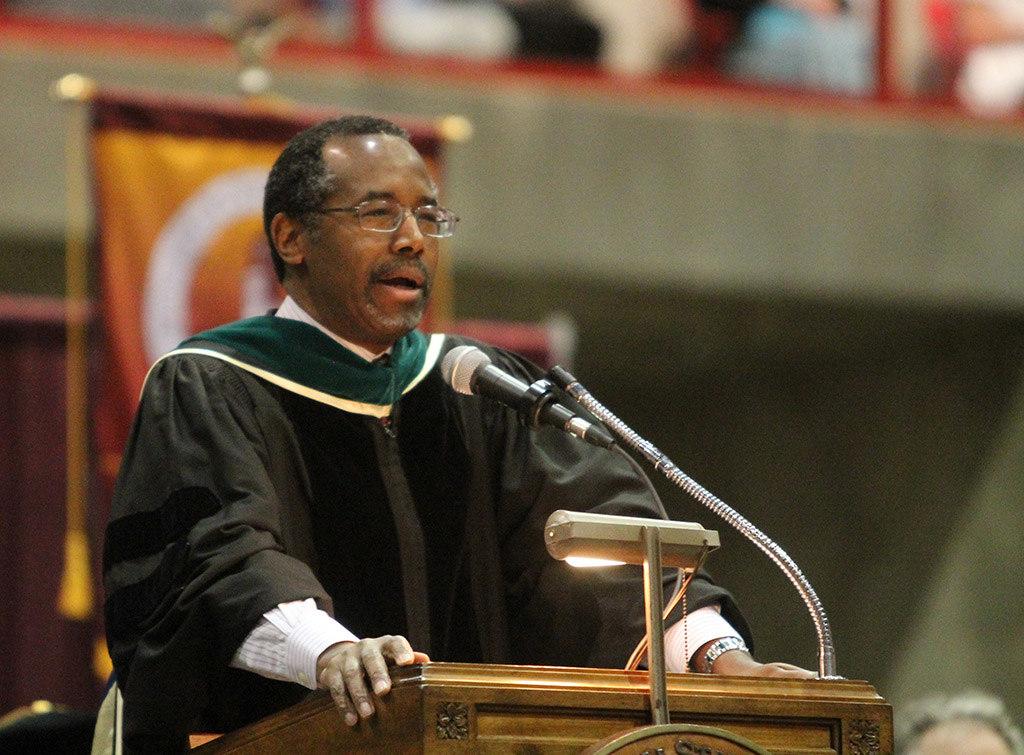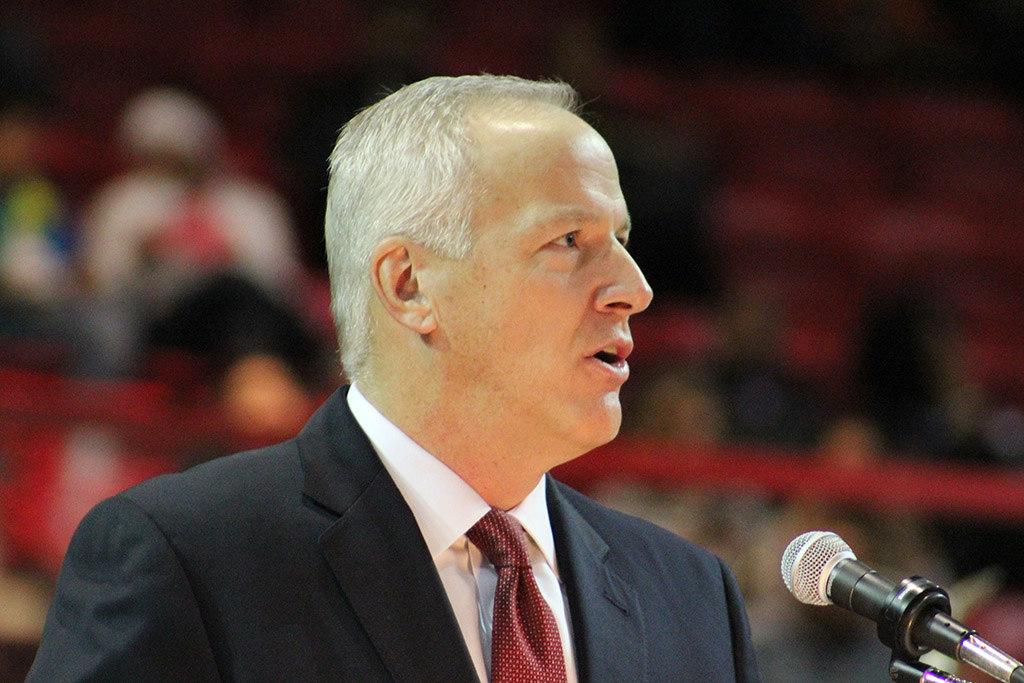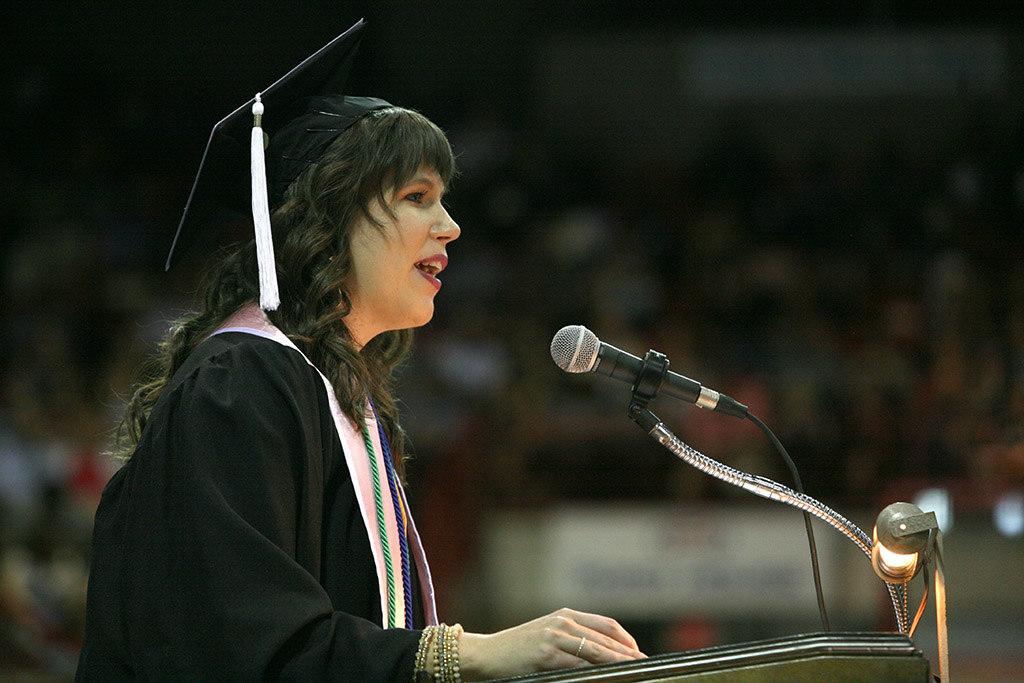Faculty members wore rainbow-colored ribbons pinned to their robes at graduation ceremonies in 2013. And when commencement speaker Ben Carson stood up, dozens of faculty members also stood up and walked out.
“Several years ago we had a speaker come in, and there were some faculty that walked out during the speech,” Debbie Barrow, director of board and government relations, said. “At that point, the president at that time committed to the faculty and staff that when we selected a speaker, we would use a committee.”
The committee consists of Barrow, Suzanne Shipley, university president, David Carlston, Faculty Senate chair, Newman Wong, Staff Senate chair and Maria Peña, political science senior and Student Government Association president.
Committee members work with speakers to write an eight to 10 minute speech and view the speech at least 10 days in advance. While this helps organize and clarifies any confusion, this also benefits sign language interpreters and translators at the graduation by giving them something to review beforehand.
“We trust that our students will speak appropriately,” Barrow said. “I haven’t heard any great concerns. We ask them to talk about their journey.”
Individual speakers like Megan Piehler, May 2017 graduate, spoke at her own graduation, and focused her speech on empowering people and encouraged graduates to think of graduation not as an end, but as a beginning. As part of the Collegiate Leadership Consultant for Gamma Phi Beta International Sorority, Piehler works and travels all over the country.
When it came time to hand in her outline for her speech, Piehler said she felt no pressure turning in her speech to Shipley because of their relationship. In her senior year, Piehler served as the student regent on the Board of Regents.
“I reviewed my speech with Dr. Shipley and just kind of chatted through what I was going for and what she was thinking,” Piehler said. “The commencement speech is a time to reflect on past experiences and set a goal mentally of what they’re striving to accomplish. It should be a moment of reflection and celebration.”
By going over the outline, committee members provide input on the speech, making it available for any changes by the speaker.
“We want to make sure that whatever message is put forward will be uplifting and encouraging to the students that are graduating and to the families that are there,” Barrow said. “We have had very good luck with our speakers. Whenever we have had a challenging situation, we just looked at our processes to make sure that we were doing everything that we could to have the best experience for everyone there.”
Committee members said they hope to focus on the new repetition of having the previous springs Hardin Scholar give the speech in the May graduation, and a graduate to speak at the December graduation. This process will be continued and tested next year with spring’s commencement speaker and current Hardin scholar, Luke Allen. The commencement members will then get together after May graduation to determine if the system is worth keeping.
“We have not made a commitment to how we are going to do it going forward,” Barrow said. “We wanted to try this one more year, because last year was the first year that we did it.”
Barrow describes it as a process that assures the governments groups, faculty, staff and students have an input on who should speak.
Lawrence Karanja, undecided junior, plans to attend the graduation and hopes to see this semesters speaker make the speech a learning experience for this semester graduating seniors.
“If it’s an alumni, I hope they would give us advice on things to look out for in the real world,” Karanja said.
1998 GRADUATE TO SPEAK AT FALL GRADUATION
As a graduate of the class of 1998 with a degree in political science, Richard Glen Young has traveled and done business in more than 150 countries. Young hopes to share his experiences and how the school has helped him get to where he is today.
“I’m thinking about the experiences that I’ve had, observations I’ve made in my career and my life that I could share with them, that they would find useful,” Young said.
As Young plans his speech, he has not received any indications that the commencement committee will be making any edits to it. He has only been asked to provide comments on the speech a week in advance.
“[Some of the comments include] the benefits and the strengths and the education from MSU that I’ve observed in my own life, how MSU education prepares a person to contribute effectively to their community and to the world and the importance of continuing to seek out and make the most of opportunities that are available to them,” Young said.
LOOKING BACK
Barrow said she can’t remember anything about the commencement speech given at her graduation, so she would like to see more speakers have the ability to say one or two great things that will stick in the students’ minds well after the ceremony.
“I hope that when they’ve been out of school for 30 years they can look back and go ‘Oh I don’t remember that person’s name, but I remember [what] they said,'” Barrow said. “It’s important that it be brief, to the point and something that’s meaningful.”
After discovering he was chosen, Young said he began to reflect on his past experiences at the university.
“I cherished the memories that I had at MSU. When I was a student here, MSU gave a lot to me, and I’d like to be able to give something back to it,” Young said. “If I can deliver some remarks that are inspirational or encouraging to the students, I’d like to be able to do that.”
Young plans to share insight with the students about how their education will benefit their lives and help them to advance their careers moving forward.
“MSU gives students an opportunity to learn in a small classroom setting,” Young said. “Professors care very much about the students and take an interest in the students’ lives and what they hope to accomplish. I was fortunate enough to benefit from that when I was a student. Because of the mentoring that I received and the advice that I received, I was able to gain an understanding of the opportunities that were available to me.”
RECENT GRADUATION SPEAKERS
- Spring 2008 — Glen Veteto, actor, and Lynwood Givens, Raytheon Corporation
- Fall 2009 — Belle S. Wheelan, president of the Commission on Colleges of the Southern Association of Colleges and Schools
- Spring 2010 — Dan Branch, Texas state representative
- Fall 2010 — James R. Wilburn, inaugural dean of the School of Public Policy at Pepperdine University and professor of strategy in Pepperdine’s Graziadio School of Business and Management
- Fall 2011— Michael A. Pepper, president of Alcoa Power and Propulsion
- Spring 2012 — Greg Abbott, Texas attorney general
- Fall 2012 — MacGregor M. Stephenson, assistant commissioner for academic affairs and research for the Texas Higher Education Coordinating Board
- Spring 2013 — Ben Carson, neurosurgeon
- Fall 2013 — Stacia L. Haynie, J.W. Annison Jr. Family Alumni Professor at Louisiana State University in Baton Rouge
- Spring 2014 — Kel Seliger, Texas state senator
- Fall 2014— Beck Weathers, author Left for Dead: My Journey Home from Everest
- Spring 2015 — Jesse Rogers, retiring president, Midwestern State University
- Fall 2015 — Catherine Davis, vice president of marketing for Neiman Marcus
- Spring 2016 — Michael Obeng, plastic surgeon and 1997 MSU graduate in chemistry
- Fall 2016 — James Franks, Texas state representative
- Spring 2017 — Megan Piehler, mass communication graduating senior
Graduating Speakers 2013-S2017

